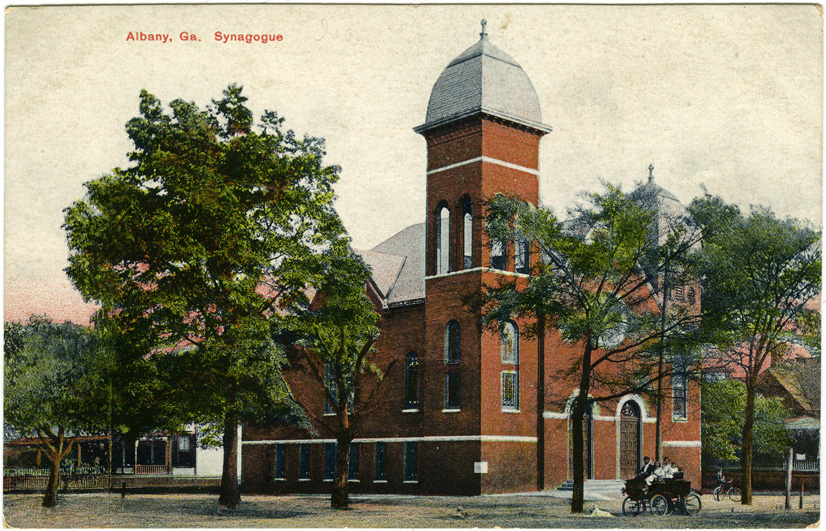3.7 Albany, Georgia
Congregation B’nai Israel, Jefferson Street and Oglethorpe Boulevard
Architect unknown, 1896
Owl Drug and Seed Co., Albany, Georgia, publisher; no date; also on back: “Printed in Germany”
This postcard shows an oblique view of Congregation B’nai Israel (Sons of Israel) in Albany, Georgia. The large but modest red brick building with corner towers of unequal height was built toward the end of the 19th century. It was similar in style to contemporary Protestant churches, except it had two main doorways on the facade instead the customary one or three. Above these was a large round window filled with stained glass. The top levels of the towers appear to have been open, the one on the left entirely so, and the one on right covered with wooden grilles. In churches, but not in synagogues, these would have held bells.
We do not have interior photos, but worshipers probably entered a small vestibule. The basement had large ground-level windows to adequately light an area that would have housed an office, classrooms, and probably a large space for receptions and other social gatherings. The sanctuary was raised a half story above the entrance level. The synagogue appears big enough to accommodate side galleries, or balconies.
The United Hebrew Society of Albany was incorporated in 1854 to acquire land for a cemetery and build a house of worship. A cemetery was purchased in 1858 and Congregation B’nai Israel was formed in 1876. The new congregation became a charter member of the Union of American Hebrew Congregations. A small synagogue was built at Jefferson and Broad streets in 1882. Fourteen years later, the larger temple shown in this postcard was constructed. The congregation hired its first rabbi in 1885; in 1898, Edmund A. Landau, a 22-year-old graduate of the Hebrew Union College, assumed the pulpit and led B’nai Israel for the next 47 years.
The synagogue was an important center and symbol for the Jewish community of Albany, but because Jews were widely accepted in the town, there were many other venues for Jewish association and involvement. In Albany in 1871, there were already 22 Jewish-owned stores, and this trend continued until World War II.
In 1940, B’nai Israel’s synagogue was partially destroyed by a tornado, which collapsed the north wall, destroyed the roof, and blew out all the windows. A new synagogue was built on the same site as the old one.
The community peaked in size in 1968. In the ensuing decades, membership continually dwindled. B’nai Israel sold its building in 1995 to a bank and built a smaller synagogue on Gillionville Road, which was dedicated in 1999.
